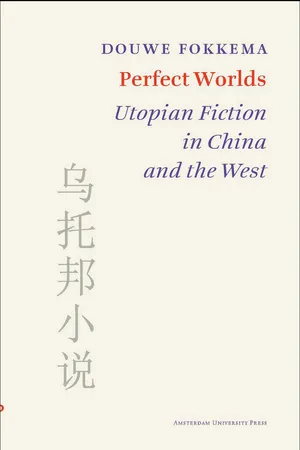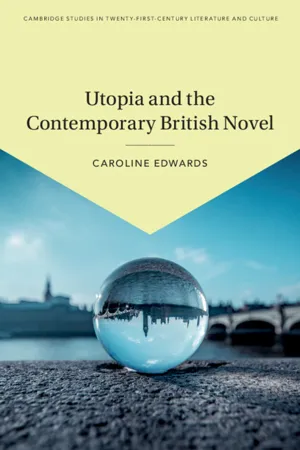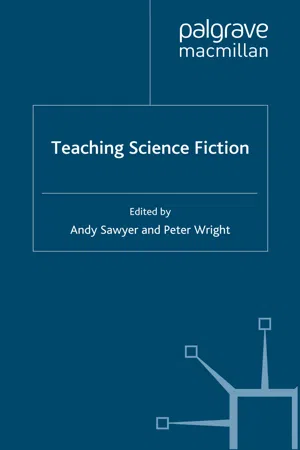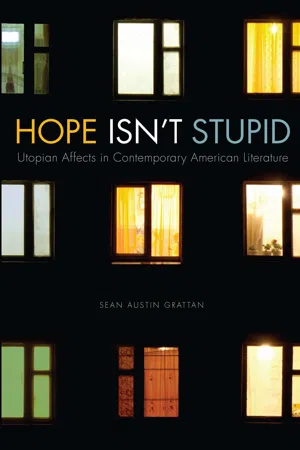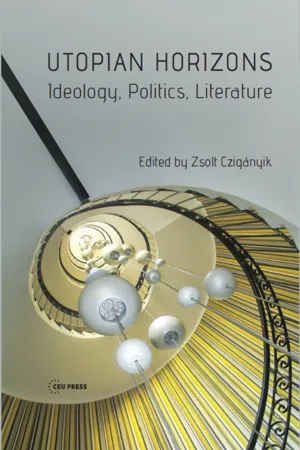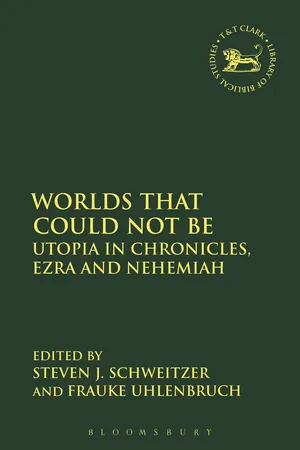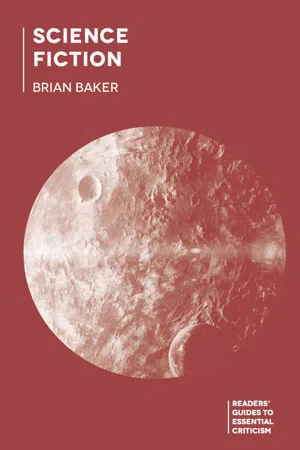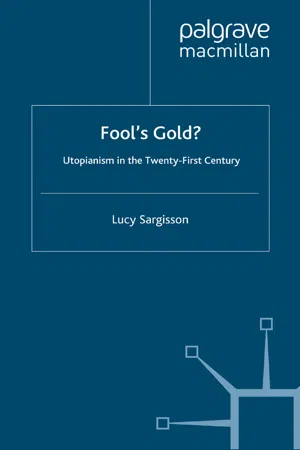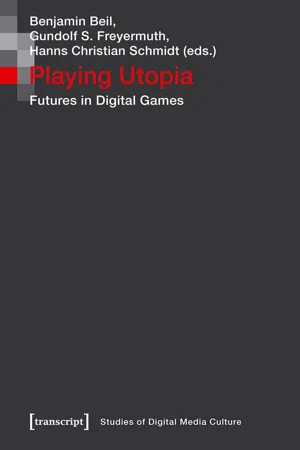Literature
Utopian Fiction
Utopian fiction is a genre of literature that presents an idealized society, often characterized by harmony, equality, and abundance. These narratives typically explore themes of social and political change, envisioning a world free from the flaws and injustices of the present. Utopian fiction encourages readers to contemplate alternative ways of organizing society and to reflect on the possibilities of a better future.
Written by Perlego with AI-assistance
Related key terms
1 of 5
11 Key excerpts on "Utopian Fiction"
- No longer available |Learn more
Perfect Worlds
Utopian Fiction in China and the West
- Douwe Fokkema, Jacques Thomassen, Kasper van Ommen, Jacques Thomassen, Kasper van Ommen(Authors)
- 2012(Publication Date)
- Amsterdam University Press(Publisher)
In order to be convincing it will tell about a secluded world, uncontami-nated by the evils of contemporary life. Usually it begins with a journey to an island or an inaccessible mountain range, to some imaginary country or another planet, or into faraway times. Utopian Fiction is a genre that clearly depends on our willingness to accept the improbable setting. Thus it calls for a robust activation of the literary convention originally defined by Co-leridge as the “willing suspension of disbelief” ( 1907 : vol. 2 , 6 ). Writers of utopian narratives therefore affirm their literary lineage rather ostenta-15 tiously by way of explicit intertextual relations, such as Huxley referring to Shakespeare, Swift and Wells to More and Plato, Houellebecq to Wells, Lao She to Swift, Lin Yutang to Rousseau and Zhuang Zi. Usually the plot of positive utopias (or eutopias) ends in a kind of conversion; and that of negative or anti-Utopian Fiction (or dystopias) in the protagonist’s escape or his/her suppression. In addition, the genre makes room for explicit expla-nation, often in the form of a dialogue between outsider and insider, and in such discussions the characteristics of an ideal society are related, includ-ing ethical and social issues. Despite the distance in space and time separat-ing the setting of utopian narratives from the world we live in, utopian fic-tion’s social and moral implications are pertinent to our present condition. Modern utopias refer to live topics such as overpopulation and overorgani-zation, inequality, oppression, and lack of purpose; whereas marriage and sexual relations, eugenics and euthanasia, and questions of common or pri-vate property discussed in older works are as relevant now as they were then. It is generally assumed that in Europe the genre of Utopian Fiction goes back to Thomas More. - eBook - PDF
- Caroline Edwards(Author)
- 2019(Publication Date)
- Cambridge University Press(Publisher)
Fiction doesn’t like good fortune; it likes dismay, preferring pessimism to optimism.’ 38 However, this preoccupation with the excitement of dystopian narrative has tended to obscure the complex interrelationship between science fiction and utopian critique, which has perhaps most famously been unpacked by Darko Suvin. Suvin’s analysis of utopia as a literary genre in Metamorphoses of Science Fiction (1979) continues to be widely cited (indeed, it is even referred to as ‘the Suvinian paradigm’), 39 and his description of science fiction as the ‘literature of cognitive estrangement’ remains one of the key parameters through which critics tend to debate utopian and SF literature. 40 Drawing on Bertolt Brecht’s theorisation of Verfremdungseffekt, he argues that SF’s imaginative framework serves to question the normative system of its author’s environment through defamiliarisation. 41 The literary genre of utopia is also, he observes, an 42 Reading Fictions of the Not Yet ‘estranged’ as opposed to a ‘naturalistic’ genre. 42 That is to say, Utopian Fiction relies on a ‘radically different location’, an ‘alternative formal framework’ that should be differentiated from any mimetic reproduction of the ‘empirical textures, surfaces and relationships’ of the author’s real- world environment. 43 In this sense, utopian narratives construct an ‘Other World’ that directly relates to our real, empirical world. Crucially, this ‘Other World’ is located within the author’s own world as a ‘positive negation’ or ‘mundus inversus’: the axiological inversion of the world that the author and his or her readers share. 44 Utopia, then, is a fictional or textual construction that estranges the author’s own world with its other- worldly alternative history. - eBook - PDF
Meals to Come
A History of the Future of Food
- Dr. Warren Belasco(Author)
- 2006(Publication Date)
- University of California Press(Publisher)
Similarly, the egalitarian utopias of novelists Edward Bellamy, William Dean Howells, and Marge Piercy may have moved more Americans to action than the abstractions of Godwin and Condorcet. Speculative fiction comes in two guises. Utopian stories inspire, mo-tivate, dare us to dream of a better future. Dystopian stories wake us up with cautionary hints about the dangerous tendencies of our time. Both genres hope to set off a chain of events that will shape the future. By en-couraging our aspirations, utopias hope to be self-fulfilling; by encour-aging us to take preventive steps, dystopias hope to be self-defeating. In short, futurist stories are overtly activist. Feminist Charlotte Perkins Gilman viewed her “pragmatopian stories” as important “cultural work” that could “introduce people to unexpected possibilities.” H. G. Wells— perhaps the greatest professional futurist—prized “kinetic utopias” that would induce readers to resist the dead weight of the past and take spe-cial steps to achieve a better tomorrow. Similarly, science fiction novelist Kobe Abe hoped that a vivid dystopian tale would “make the reader con-front the cruelty of the future” and discover “the abnormal in that which is closest to us.” Harold Berger urges us to study dystopias “to resolve which paths must not be taken, which deeds must not be done.” 3 While some may protest that fantasy stories count for less than sober white papers, we should probably not draw too distinct a difference be-tween the two. All futures are speculative and imagined. Where literary futures differ from, say, USDA Yearbook or World Watch futures is in the degree of license afforded the imagination. Fiction writers do have more freedom to stray beyond present trends and paradigms, to roam “outside the box.” They can factor in wild cards, unexpected twists and turns, surprise decisions. But the two forms—art and social science—do interact. - eBook - PDF
- A. Sawyer, P. Wright, A. Sawyer, P. Wright(Authors)
- 2011(Publication Date)
- Palgrave Macmillan(Publisher)
Seen in this context, utopian literature becomes less a subgenre of science fiction than the literary expression of political ideals, likewise designed to influence reality. H.G. Wells, in fact, went so far as to suggest that ‘the creation of Utopias – and their exhaustive criticism – is the proper and distinctive method of sociology’. 12 To see utopian literature in this light, of course, is to run the risk of minimizing its literary aspects – to see the narrative as merely a vehicle for the expression of political ideas, a sort of literary clothing, where fashions change over time. Yet even where there is acceptance that more recent utopian science fiction has succeeded in resolving the aes- thetic problems that bedevil its precursors – that considered as literature, works such as Le Guin’s The Dispossessed (1974) or Delany’s Triton (1976) are far more successful than, say, Bellamy’s Looking Backward, this is not Utopia, Anti-Utopia and Science Fiction 59 always viewed as an unmixed blessing. As Krishan Kumar points out, whatever its literary merits, more recent utopian literature has failed to stimulate anything like as much public debate as did Looking Backward or A Modern Utopia, and that indeed its more limited appeal is in fact a direct result of its use of a science fictional format, rendering it more difficult for such work ‘to break out of its specialized literary ghetto’. 13 Similarly, Ruth Levitas argues that the self-conscious, self-reflexive ambiguity of much recent utopian writing, for all its artistic and intel- lectual appeal is not merely exploratory and open, it is also disillusioned and unconfident… The presentation of alternative futures, multiple pos- sibilities and fragmented images of time reflects a lack of confidence about whether and how a better world can be reached. - eBook - PDF
Hope Isn't Stupid
Utopian Affects in Contemporary American Literature
- Sean Austin Grattan(Author)
- 2017(Publication Date)
- University Of Iowa Press(Publisher)
Recto Runninghead 3 utopian reading. It is in this way that literature can also be understood as acting or existing affectively because the charge it carries has the potential to catalyze human activity, pushing people together or pulling them apart. What We Talk About When We Talk About Utopia Definitions of utopia, understandably, often suffer from an ambivalent and ambiguous relationship to themselves. Since Thomas More and the utopian genre’s inception, utopia has been both the description of an impossible place and the impossible social relations within that place. The definitions that I find most productive are those that offer a dialec-tical relationship among readers, authors, and their worlds. In this way the tension in the struggle for the utopian in the present moment of that utopia comes to the fore. Literary critic Ken Roemer offers a useful defi-nition of utopian literature of the late nineteenth century as: “1) a radical amelioration which 2) grows out of a realistically described and poten-tially catastrophic present and 3) profoundly effects the individual’s future physical and cultural environment” (229). Though Roemer’s focus is the nineteenth century, his definition—especially his focus on the potentially catastrophic present—resonates with the through line of catastrophe run-ning from the Cold War to the War on Terror, from AIDS to Occupy Wall Street. In other words, though each of these historical moments is profoundly different, an apocalyptic millennialism has been a consis-tent organizing affective state within utopian discourse. Utopian scholar Lyman Tower Sargent describes utopia as a story that can be read as “trag-edy or farce, but it can also be read . . . as a tale of hope, hope engendered, hope deferred, and hope renewed. This is a story of the men and women who dreamed of a better life for all of us and of those who tried to create that better life” (1). - eBook - PDF
Utopian Horizons
Ideology, Politics, Literature
- Zsolt Cziganyik(Author)
- 2017(Publication Date)
- Central European University Press(Publisher)
INTRODUCTION Utopianism: Literary and Political Z SOLT C ZIGáNYIK I n 2016 we celebrated the five-hundredth anniversary of Thomas More’s Utopia . The year 1516 is significant, even though it marks only the birth of a neologism and a literary genre that evolved into a very rich tradition, while utopian thought, the ability to think in alternatives about human life, is probably as old as human thinking itself. Utopia has always been in the no man’s land between literature and the social sciences: literary works, including utopias, are often ignored by the social sciences, while works of imaginary literature are sometimes used as illustrations. This volume tries to look at utopian literature as a source of genuine political understanding. 1 Simultaneously, literary scholars often criticize (and even ignore) utopias for their dubious literary qualities and their lack of well-developed characters, genuine conflicts, and complex narratives. As we can see, the context for the interpretation of utopias is not unproblematic, and there have been drastic changes in the way the subject of utopia is discussed, from the wholesale rejection of utopian projects by both Fried-rich Engels and Karl Popper to the contemporary recognition of utopia as a dynamizing force in the social sciences, as reflected by the 2012 annual meeting of the American Sociological Association entitled “Real Utopias: Emancipatory Projects, Institutional Designs, Possible Futures.” 2 Utopianism can significantly contribute to the understanding and improvement of human life, but the understanding of utopia needs to 1 Cf. Maureen Whitebrook, “Politics and Literature?,” Politics 15, no. 1 (1995): 55–62. 2 See http://www.asanet.org/sites/default/files/2012_am_final_program_c_opti-mized.pdf 2 UTOPIAN HORIZONS involve a number of disciplines, in the realms of both the humanities and the social sciences. - eBook - PDF
Worlds that Could Not Be
Utopia in Chronicles, Ezra and Nehemiah
- Frauke Uhlenbruch, Steven J. Schweitzer(Authors)
- 2016(Publication Date)
- T&T Clark(Publisher)
21. Suvin, “Locus, Horizon, and Orientation,” 70, distinguishes in fact between two disciplines in utopian studies: The empirical focuses on history, political theory, planning, religion, ecology, futurology, but rarely philosophy or literary studies. The ¿ ctional looks at science ¿ ction, woman’s studies, literary theory, political philosophy. What connects the two could be what Suvin labels as “utopian thought.” 22. Sargent, Utopianism , 22. 23. Sargent, “Three Faces of Utopianism,” 7. 24. Wu, “Understanding Utopian Literature,” 231, also thinks that the reference to “perfect” is problematic, since despite a qualitative difference between absolute perfection and more perfect, the point is that perfection forms part of the working de ¿ nition, a notion very few utopian writers ascribed to. Even More’s Utopia is far from perfect, given its totalitarian direction. Sargent, “Three Faces of Utopianism,” 9, is very clear on the issue of perfection: it is not a notion that should be present in the de ¿ nition of utopia, because with the notion of perfection the logic of the anti-utopian argument disappears. It is for this reason that Sargent employs the word “better” in his de ¿ nition. S NYMAN Dr Who ’s “Utopia” and Chronicles 43 his dystopian reality is not that far away from the utopian one that the people will encounter, it is only a difference in degrees. To summarize: Utopia can thus be de ¿ ned as a literary text that constructs an imaginary world as a disjunctive alternative to the con-temporaneous social reality of the targeted audience who experiences their reality as de ¿ cient —a ¿ ctional reality in which an imagined com-munity is thought to be at a better place—although not perfect —than the one the readers currently inhabit. Utopias can be constructed in a variety of ways and with various purposes in mind. Of considerable importance for the discussion on Chronicles, are dystopia, critical utopia, and nostalgic utopia. - eBook - PDF
- Brian Baker(Author)
- 2017(Publication Date)
- Red Globe Press(Publisher)
The satirical utopia d. The anti-utopia e. The ambiguous or critical utopia 2. Cockaigne 3. Science fiction a. Atlantis legends b. Science fiction c. Fantasy d. Tales of the Future e. The utopia of the mind (Daumal, Hesse) f. Imaginary/extraordinary voyages g. Uchronia 4. Robinsonades 5. Gulliveriana 6. Fairy tales 104 SCIENCE FICTION 7. Romance 8. Oriental tales C. Non-fiction 1. Instructions to princes 2. Some works of political philosophy 3. Ideal cities 4. Urban planning 5. Visionary architecture (Sargent, 1992, p. 191) We will elucidate the utopian terminology in a moment, but here it is worth noting that, much unlike Suvin, Sargent places SF as a sub-genre of Utopian writing (and even as a sub-genre of itself!), rather than the other way round. Sargent is not a theorist of SF, it should be noted, and in a sense his placing of SF as a sub-genre of itself testifies to either a literary complexity he is not prepared to enter into in this schema, or SF’s own rather confusing problematics of definition and genre his- tory that we have already encountered. That being said, Sargent, like Suvin, has a rather maximal conception of the generic field, where uto- pia can range across an extremely diverse field of texts, with extremely diverse formal features, operations and intentions. With the inclusion of imaginary voyages, Robisonades, and even fantasy in his list, Sargent’s inclusive taxonomy of Utopian Fictions mirrors Suvin’s ‘long’ and broad conception of SF’s history, but reorders the categories to emphasise that this is taken from the point of view of utopia. Utopia, rather than SF, becomes the generic continuum into which the sub-genres are fitted. Sargent also offers direct definitions of different forms of utopian expression, which again I will quote here in full: Utopianism – social dreaming. Utopia – a non-existent society described in considerable detail and nor- mally located in time and space. - eBook - PDF
- Magoroh Maruyama, Arthur M. Harkins, Magoroh Maruyama, Arthur M. Harkins(Authors)
- 2011(Publication Date)
- De Gruyter Mouton(Publisher)
After the French Revolution, for exam-ple, Utopias began to differ greatly from the early classical models. There was greater future-directed activism so that Utopias began to enter the stream of history as possible future societies (Mullins 1972: 506). However, with the introduction of the distinction between ideol-ogy and Utopia, a serious attack was made on the utility of Utopian thought. This was particularly the case with Marx who postulated that to be Utopian means to be out of step with modern economic develop-ment and to ignore the class struggle and the role of the proletariat in it. But as Hunt observed (1957: 181), when Marx went on to describe the communist state of the future, his language became more Utopian than that of the French socialists from whose influence he never freed himself. It is simplistic, indeed, to attempt to draw sharp distinctions between ideology as present-oriented historical consciousness, myths as past-oriented traditional consciousness, and Utopia as future-oriented visionary consciousness. The terms have been used interchangeably throughout history and there is often a thin line separating actual political ideologies, visionary societies, and timeless millennia. Mil-lenarism, in particular, has been a difficult concept because it incorpo-rates political, religious, and mythological as well as Utopian elements. The most important characteristic of the millennial dream is the preparation for imminent salvation, and it is exactly this central idea which separates the millenarians from the Utopians (Thrupp 1962). Fantasies of a miraculous realm, messianic hopes of things to come, and various forms of militant apocalypses have provided the backdrop not only for Utopian expectations, but also food for specific political movements and for the emergence of sociopolitical trends which borrowed their durability and rhetoric from the religious impulse (Tuveson 1949; Cohn 1957). The term utopia has had a variegated definitional career. - eBook - PDF
Fool's Gold?
Utopianism in the Twenty-First Century
- L. Sargisson(Author)
- 2012(Publication Date)
- Palgrave Macmillan(Publisher)
For him, science fiction was ‘a literary genre whose necessary and sufficient conditions are the presence and interaction of estrangement and cognition and whose main formal device is an imagina- tive framework alternative to the author’s empirical involvement’ (Suvin, 1973, 375). Utopia is ‘a verbal construction of a particular quasi-human community where socio-political institutions, norms and individual rela- tionships are organized according to a more perfect principle being based on estrangement arising out of an alternative historical hypothesis’ (Suvin, 1979, 49). 9 We can see that, for Suvin, estrangement both characterizes and binds science fiction and utopia. Suvin’s conception of estrangement has roots in literary and politi- cal theories: Russian Formalism and German Marxism. From Formalism comes the suggestion that certain narrative devices have the effect of disrupting the familiar. From Marxism, and in particular from Bertholt Brecht’s work, Suvin extracted a political function for estrangement, which has de-alienating or emancipatory potential. He cites Brecht as follows: ‘A representation which estranges is one which allows us to recognize its 20 Fool’s Gold? subject, but at the same time makes it seem unfamiliar’ (Berthold Brecht, cited in Suvin, 1973, 374). This permits a new cognition of the now and creates a moment which is potentially liberating. Placing familiar objects (or subjects) in unfamiliar settings allows us to see differently. Our old and tired perceptions can thus be revitalized and transformed. The play of cognition and estrangement is central to Suvin’s work, as is the idea of the new, or as he terms it, the novum. For Suvin, these factors are interconnected and function interdependently. For some commentators, then, estrangement is a technical term, utilized to explain the internal mechanisms and form of utopian texts. In this sense, the term has a specific genealogy and it performs specific functions. - eBook - PDF
Playing Utopia
Futures in Digital Games
- Benjamin Beil, Gundolf S. Freyermuth, Hanns Christian Schmidt, Benjamin Beil, Gundolf S. Freyermuth, Hanns Christian Schmidt(Authors)
- 2019(Publication Date)
- transcript Verlag(Publisher)
From today’s perspective, these utopias are blending progressive and retrograde, democratic and au-thoritarian, liberating, and oppressive elements. In his review of Michael Robertson’s, The Last Utopians: Four Late Nineteenth-Century Visionaries 99 Bellamy’s book was not only a sensational literary success, selling hundreds of thousands of copies. It also initiated a political movement. In the United States, hundreds of “Bellamy Clubs” were founded, advocating the nationalization of the means of production, and also some utopian communities, whose members tried to live according to the rules of the novel. 34 | G UNDOLF S. F REYERMUTH and Their Legacy , 100 Adam Gopnik summarizes the conflicting ideological situation at the end of the 19th century: “The utopian feminists are also eugenicists and anti-Semites; the men who dream of a perfect world where same-sex attraction is privileged also unconsciously mimic the hierarchy of patriarchy, putting effeminate or cross-dressing ‘Uranians’ at the bottom of their ladder. The socialists are also sexists, and the far-seeing anarchists are also muddle-headed, mixed-up mystics.” 101 However, by then the time of utopian novels was running out, as the title of Robertson’s study indicates. A new variant of writing about a better future developed: science fiction. Although the term science fiction did not come into use until the 1920s, the rise of the new genre began already in the second half of the 19 th century. 102 Its pioneer was Jules Verne who published, amongst others, From the Earth to the Moon in 1865, 103 and Twenty Thou-sand Leagues Under the Sea in 1869. 104 Around the turn of the 20 th century, H. G. Wells distinguished himself as the most influential author in this field, not least because he wrote not only science fiction but also dystopian novels and non-fiction books about the future.
Index pages curate the most relevant extracts from our library of academic textbooks. They’ve been created using an in-house natural language model (NLM), each adding context and meaning to key research topics.
